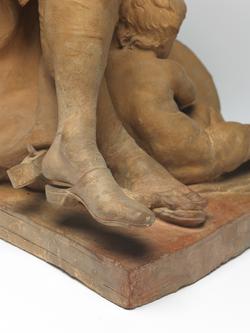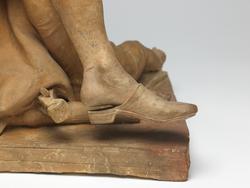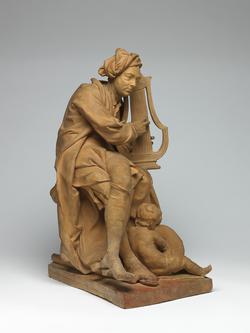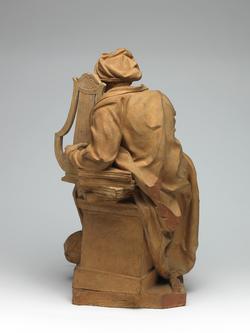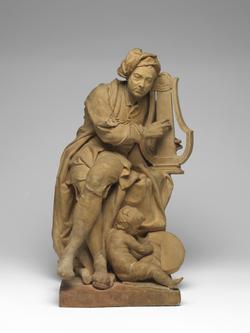Current Location: Gallery 3 (case on right as facing the door into Gallery 4)
Titles
George Frideric Handel (1685-1759)
Maker(s)
Sculptor:
Roubiliac, Louis François
Entities
Categories
Description
Terracotta, modelled in the round. The composer is seated on a plinth, plucking the strings of a lyre. He is shown in undress, wearing a night-cap and gown, and slippers, one of which has fallen off and is under his foot. A boy 'recording angel' sits at his feet taking down the notes.
Notes
History note: Thomas Hudson by 1751); sold in his sale, 26th February 1785, lot 37; purchased by Nathaniel Smith and sold by him to his ma;ster, Joseph Nollekens; sold in his sale, 3rd July, 1823, lot 60 (as by Carlini); purchased by 'Hamlet, the silversmith', presumably Thomas Hamlet; probably purchased for Northwick Park at Hamlet's sale held by Robins, 29th July, 1833 (only recorded copy of the sale cat. derives from the Northwick Park Library); Captain E.G. Spencer-Churchill (1876-1964), Northwick, by whom given to the Fitzwilliam Museum.
Legal notes
Given by Captain E.G. Spencer-Churchill
Measurements and weight
Diameter: 36.2 cm
Height: 47.2 cm
Width: 26.9 cm
Acquisition and important dates
Method of acquisition: Given
(1922-12-07)
by
Spencer Churchill, E. G., Captain
Dating
18th Century, second quarter
George II
Production date:
before
AD 1738
Note
In depicting Handel in the act of composing, Roubiliac encourages us to imagine the the sound of the music being played. Eyes half-shut, the composer leans towards his lyre (a small stringed instrument), concentrating on the notes produced as he plucks the strings. At his feet, his amanuensis (a naked putto) listens carefully, scribbling down the score as Handel plays. The music is probably for Alexander’s Feast, composed in 1736, in which lute and oboe feature (as shown in the sculpture). On the unveiling of the marble statue in April 1738, visitors were astounded by its realism, and would no doubt have enjoyed being able to compare the sculpture with the real man, as Handel regularly frequented the Gardens.
This terracotta was the model for Roubiliac’s first major work after settling in London in c.1730: a life-size statue in Carrara marble of the famous composer, Handel made for display in the Vauxhall Pleasure Gardens (now in the Victoria and Albert Museum). Life-size marble statues were the most expensive type of portrait sculpture, traditionally reserved for monarchs and military heroes and normally commissioned for prominent public spaces. Sitters were generally shown standing and dressed in formal attire. The fact that Handel was a German musician, portrayed in casual attire in a relaxed pose, made this informal image a radical departure from accepted convention.
School or Style
Rococo
People, subjects and objects depicted
Project
Project
Materials used in production
All or most of the surface appears to be united by a thin pinkish-buff terracotta-coloured wash over a whitish gesso? ground; the latter revealed in thinner areas of wash (e.g. the crease above the PR thigh of the putto) and by minor damage (e.g. chip from toe of Handel's PL slipper).
Jo Dillon 2016-08-24
Terracotta
Techniques used in production
Hand-modelling
: Terracotta hand-modelled, and fired
References and bibliographic entries
Related exhibitions
Identification numbers
Accession number: M.3-1922
Primary reference Number: 29736
External ID: CAM_CCF_M_3_1922
Stable URI
Audit data
Created: Saturday 6 August 2011
Updated: Tuesday 25 June 2024
Last processed: Thursday 30 October 2025
Associated departments & institutions
Owner or interested party:
The Fitzwilliam Museum
Associated department:
Applied Arts
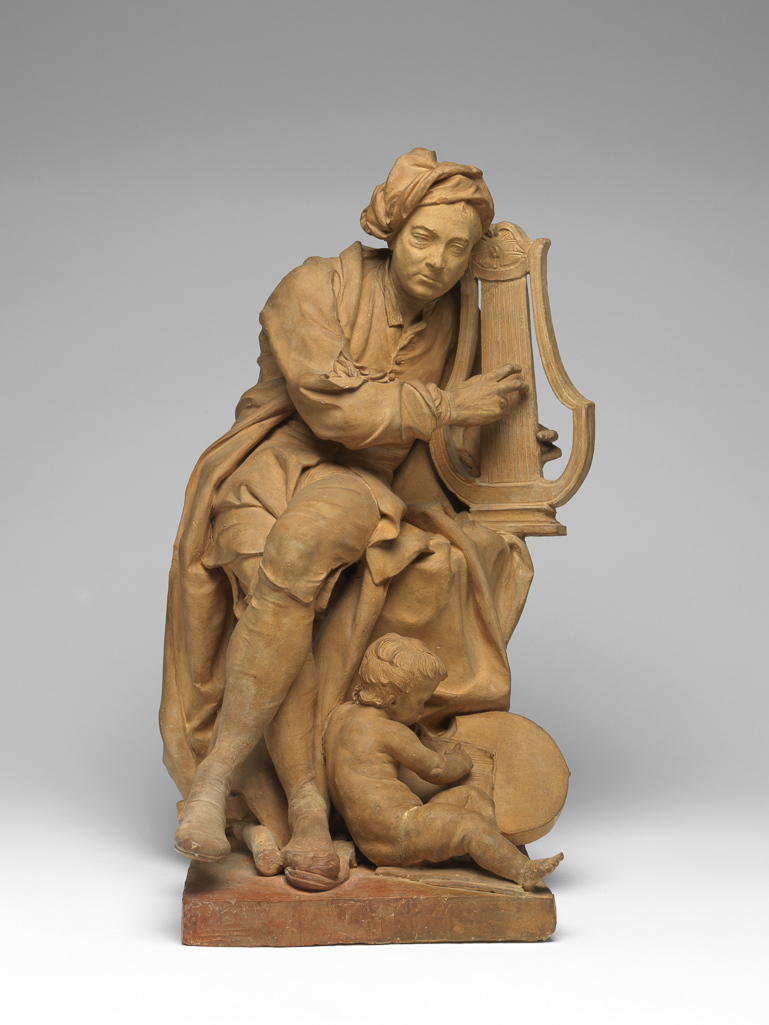
 IIIF Manifest
IIIF Manifest
